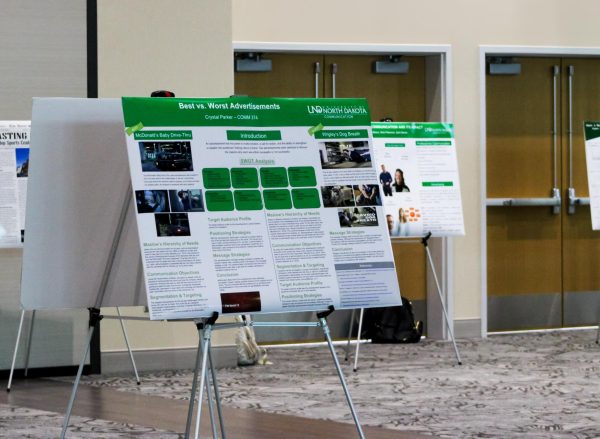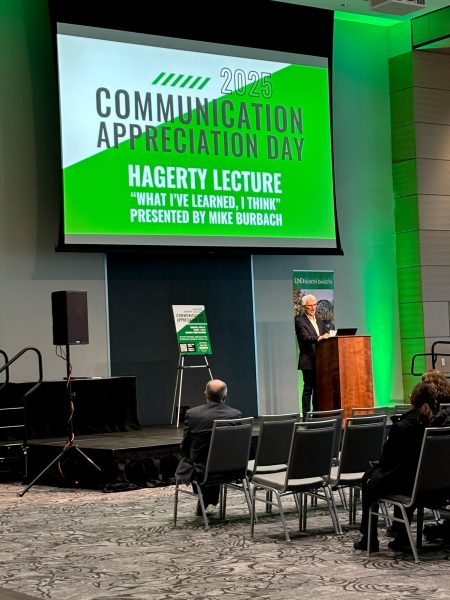Law school hosts panel on trafficking
While North Dakotans have benefitted in many ways from the shale oil boom over the past several years, there also have been several adverse effects state leaders have been working to address after the rapid expansion of the state’s population and economy.
The North Dakota School of Law hosted a symposium titled “Social Impacts of the Oil Boom” this past Thursday in the Baker Courtroom.
The daylong event included panels focusing on various issues surrounding the rapid economic development in the western part of the state. While the drop in the price of oil has slowed this growth considerably in recent months, many of the issues are still at the forefront of policy discussions, both in the state and nationwide.
Topics included concerns over illicit sex and slavery, exploited immigrant workers, access to affordable housing, crime, human trafficking and impacts on the Indian reservations.
The Dakota Student attended a panel on human trafficking in North Dakota, which featured Christina Sambor, the coordinator of FUSE, the anti-trafficking coalition in North Dakota, and director of the North Dakota Human Trafficking Task Force; Mac Schneider, a Grand Forks attorney and state Senator from District 42; Shane Conroy, a special agent with the Department of Homeland Security base in Fargo; and Tim Purdon, an attorney and former United States Attorney for the District of North Dakota.
Sambor, who received her bachelor’s degree from UND before attending law school at Pepperdine University, began the panel by explaining that while human smuggling and international kidnapping are viewed as human trafficking, there is a more specific definition of what constitutes human trafficking, which may include both of those activities but is not strictly defined by it.
“What we tend to see in the United States and what meets the federal and state definition of human trafficking really has to do with forcing someone to engage in commercial sex or labor either without adequate payment or for some sort of commercial benefit for a third party,” Sambor said. “The key thing to acknowledge in this is that a North Dakotan can traffick a North Dakotan in North Dakota.”
Meeting the statutory definition of human trafficking involves the use of force, fraud and coercion, whether it involves forced sexual solicitation or labor.
Sambor described the work, funding and collaboration that has occurred over the past several years to address the human trafficking concerns in the state of North Dakota at both the state and federal level. Two years ago, she was one of the few full-time workers dealing with human trafficking issues in the state. Now there are 13 staff positions in addition to other management positions focused on human trafficking in North Dakota.
Conroy, who investigates human trafficking crimes and is a member of the Human Trafficking Working Group, highlighted the importance of improving the relationship between law enforcement and victims’ services as both a way of assisting victims and effectively prosecuting human traffickers.
Schneider, who serves as the Democrat-NPL leader in the North Dakota Senate, described some of the work to address human trafficking that he and others had done in the Legislature.
In 2009, before human trafficking was seen as a concern in North Dakota, the Legislature passed a bi-partisan bill co-sponsored by Schneider that made made engaging in human trafficking a Class A felony. If the trafficking involved a minor, the punishment isw elevated to a Class AA felony.
Schneider credited the work of several journalists who work for Forum Communications in shining light on the issue of human trafficking over the last
several years.
“It became quite clear that this was a scourge in North Dakota and that our laws had to be much better than they were,” Schneider said. ”So in this session, there really was a completely bipartisan effort to comprehensively go after human trafficking.”
In the most recent legislative session, the Legislature passed multiple bills, including “safe harbor” protections, which means minors who are victims of human trafficking are treated like victims rather than prostitutes.
Additionally, North Dakota law now allows for certain criminal convictions to be expunged if they were committed as a result of the person being a victim of human trafficking, and $1.25 million was appropriated to better fund victim’s services in the state.
“Treating these individuals as victims and providing them with support is the right thing to do from a moral perspective, but also critically important, as our federal folks pointed out, to effectively prosecute these individuals (human traffickers),” Schneider said.
Schneider also sponsored a bill to create a “John’s School” program to educate and rehabilitate people who are caught soliciting prostitutes, which is modeled after a similar program in Minnesota.
Backpage.com is frequently used by human traffickers who are using trafficked persons as prosititutes, but it also is used by law enforcement to track and conduct sting operations against human traffickers. Conroy noted that the Fargo region, which also has experienced noticeable economic growth over the past decade, actually has more activity on Backpage.com than the Bakken region.
Purdon, who was appointed by President Barack Obama and served as the U.S. attorney general in the state from 2010 to 2015, said there was some pushback when he first started talking about the rise in crime due to the influx of people to the Bakken region, as some saw him as an attorney general appointed by a Democratic president who was targeting the fossil
fuel industry.
Members of the panel noted that the issue of human trafficking isn’t specific to a certain industry, but rather a rapid increase of a highly paid workforce, mostly male, to an isolated region.
“There wasn’t really an understanding that this went on here. It’s gone on here for a long time, and a lot of the spotlight has occurred because of what happened in the Bakken,”
Purdon said. “But what we learned is that Grand Forks and Fargo have been having these problems for many years as well.”
For more information on efforts to combat and address issues related to human trafficking in North Dakota, visit http://www.projectfuse.org/.
Sean Cleary is the editor-in-chief for The Dakota Student. He can be reached at sean.d.cleary@und.edu







